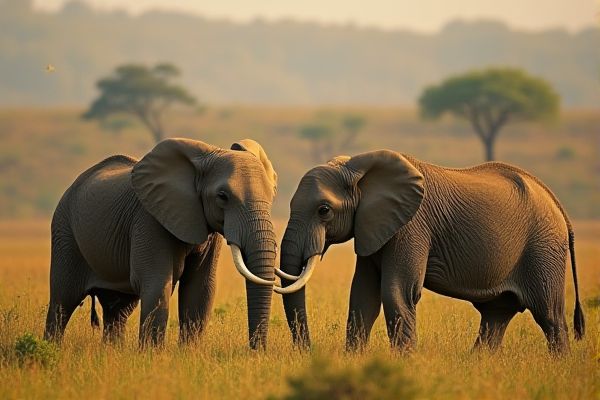
Zambia offers various conservation job opportunities across national parks, wildlife reserves, and community-based projects focused on sustainable development. Organizations such as the Zambian Wildlife Authority and African Parks actively seek conservationists, researchers, and community coordinators to help preserve the country's rich biodiversity. Positions often involve fieldwork related to wildlife monitoring, habitat restoration, and community engagement, allowing individuals to make a tangible impact. Networking with local conservation NGOs and participating in volunteer programs can significantly increase your chances of finding a rewarding role in this field.
Job Description
Conservation jobs in Zambia often involve protecting wildlife and natural habitats, ensuring biodiversity remains intact. Positions may include wildlife management, research, and community engagement, emphasizing sustainable practices. Many roles require collaboration with local communities to promote conservation awareness and develop eco-friendly initiatives. These opportunities allow you to contribute meaningfully to the preservation of Zambia's rich ecosystems while fostering local economic development.
Requirement
Conservation jobs in Zambia often require a solid educational background in environmental science, wildlife management, or related fields. Practical experience in conservation practices, such as habitat restoration or wildlife monitoring, is highly desirable. Familiarity with local ecosystems and biodiversity can enhance your application, as it demonstrates a commitment to preserving Zambia's unique natural heritage. Strong communication and teamwork skills are also essential, as many conservation projects involve collaboration with local communities and organizations.
Salary and Perks Expected
Conservation jobs in Zambia typically offer competitive salaries that vary based on the specific role and experience level. Entry-level positions may start from around $500 to $800 per month, while more experienced roles or managerial positions can reach upwards of $2,000 monthly. In addition to salary, many organizations provide benefits such as housing allowances, health insurance, and opportunities for professional development. Working in Zambia's rich biodiversity regions allows you to contribute significantly to wildlife protection and community education efforts.
Similar Job Names
- Conservation Scientist
- Wildlife Biologist
- Park Ranger
- Environmental Consultant
- Biodiversity Officer
- Ecologist
- Conservation Manager
- Research Coordinator
- Community Engagement Specialist
- Environmental Education Officer
- Habitat Restoration Specialist
- Protected Area Manager
- Marine Conservation Officer
- Ecotourism Development Manager
- Species Recovery Specialist
Job Expectation Concept
Conservation jobs in Zambia encompass a variety of roles aimed at protecting and managing the country's rich biodiversity. Positions often include wildlife research, habitat restoration, and community engagement, emphasizing the importance of sustainable practices. You can find opportunities with governmental organizations, non-profits, and private sector companies committed to conservation efforts. Gaining experience in environmental science, biology, or tourism can enhance your eligibility for these impactful roles within Zambia's unique ecosystems.
Career Advantage and Weakness
Conservation jobs in Zambia offer the unique opportunity to engage with one of Africa's most biodiverse regions, allowing individuals to contribute to the protection of wildlife and natural resources. Many positions provide hands-on experience with conservation practices, enhancing your skills in environmental management and ecological research. However, challenges such as limited funding and reliance on donor support can affect job stability and growth prospects in this sector. Navigating the complexities of local and international conservation policies is essential for those seeking to make a meaningful impact in Zambia's conservation landscape.
Important Thing Must Know
Conservation jobs in Zambia focus on protecting the country's rich biodiversity and natural resources. Positions often involve fieldwork, research, and community engagement, allowing you to make a real impact on wildlife preservation. Knowledge of local ecosystems, fauna, and flora is essential for success in these roles. Many organizations offer training programs to enhance your skills and expertise in conservation practices. Networking with local conservation groups can also provide valuable insights into job opportunities and ongoing projects in the region.
Alternative Career Options
Zambia offers a variety of alternative career options for individuals interested in conservation beyond traditional roles. Opportunities exist in ecotourism, where you can contribute to sustainable travel practices while promoting environmental awareness. Engaging in community education and outreach initiatives allows for the sharing of knowledge about conservation efforts and fostering public support. Additionally, roles in wildlife management, research, and environmental policy development provide avenues for making significant impacts on the preservation of Zambia's rich biodiversity.
Companies List
- World Wildlife Fund (WWF)
- Conservation International
- BirdLife Zambia
- Zambia Wildlife Authority (ZAWA)
- Wildlife and Environmental Conservation Society of Zambia (WECSZ)
- African Wildlife Foundation
- Zambezi Society
- Natural Resources Conservation Authority (NRCA)
- International Union for Conservation of Nature (IUCN)
- Zambia National Parks and Wildlife Management
List of Ideal City
Lusaka, the capital of Zambia, serves as a hub for conservation organizations and offers numerous job opportunities in wildlife management and environmental protection. Livingstone, located near the Victoria Falls, is a vibrant area with a strong emphasis on eco-tourism and conservation projects that protect local biodiversity. Kasama, in the Northern Province, provides a serene environment perfect for fieldwork, with various conservation initiatives dedicated to sustainable agriculture and wildlife preservation. Other notable cities, such as Ndola and Chipata, also offer valuable prospects for those interested in contributing to Zambia's rich natural heritage through conservation efforts.
 zambia-jobs.com
zambia-jobs.com